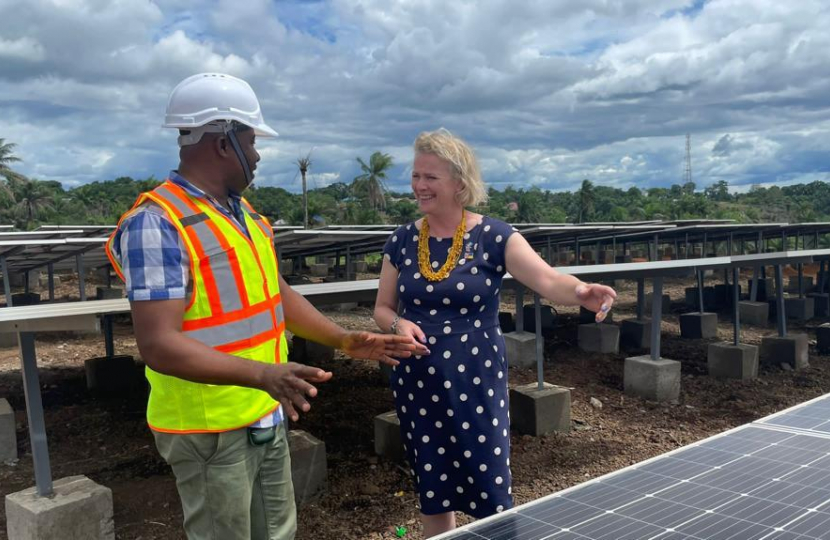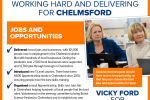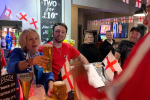
Monday 23 May Every year the UK hosts the Global Education Forum in London. The UK is one of the largest donors to girls' education in developing countries.
Investing in education, and particularly the education of girls, is one of the best ways to reduce global poverty. In many of the world's poorest countries the proportion of girls finishing school is very low. Girls drop out of school for many reasons. Often, if they lack access to water and toilets, they don't attend school when they have their periods and then they fall behind on classes. Violence can also be an issue.
In countries where education is not free, sometimes parents can't afford school fees for all their children and then choose to pay for their sons rather than their daughters. Low levels of female education tend to go hand in hand with high teenage pregnancy, persistent poverty and thus insecurity. But when girls complete school they then tend to have jobs, earn income and have children later.
I spend the day in back to back meetings with Education Ministers from countries across the globe discussing their plans for the future. The UK has done a lot of research both at home and overseas on the best ways to use technology to improve education which is helping children in many countries. My final meeting is with the Ukrainian Minister for Education. He asks us to help set up exam centres for the students who have recently come to the UK so that they can sit their final school exams and get qualifications. He asks if we can help supply school busses for the children still in Ukraine, many schools have been destroyed so children face longer journeys. It is heart wrenching.
On entering the House of Commons for evening votes I am struck by an egg which has been lobbed over the railings. Looking down I see a number of smashed eggs, clearly the thrower has been trying to hit others. Eggs are pretty horrid missiles, but it could have been something worse. I quickly report this. It's late in the evening when I hear that someone has been arrested and charged.
Tuesday 24 May A long flight to Ghana.
Wednesday 25 May I'm in Ghana for the annual meetings of the African Development Bank. Before the main meetings start I meet the bank President. I sign a new guarantee package which will help unlock $2billion of funding for the bank so that they can invest in green infrastructure projects across the continent. This novel financing is part of our commitment to help tackle climate change globally. I spend the morning at the Annual Meeting and also meet scientist and tech experts to discuss our co-operation on innovation before heading off for another plane.
In Sierra Leone, to get to the capital city of Freetown one either needs to make a long 3 hour drive or take a boat across the lagoon. I take the boat and spend the evening meeting UK businesses that are making investments in the country, civil society representatives and women’s rights activists.
Thursday 26 May The day starts with a meeting with the President. We discuss our shared passion to support women and especially girls education. Over the past five years, the UK has helped improve learning for nearly a million children. At a school I see the teaching materials that we have developed and hear from girls how they now feel safer at school thanks to projects we have led to reduce violence. Just a few years ago boys were outperforming girls by 30% in final exams, now they are equal.
Sierra Leone has one of the highest rates of maternal deaths in the world. At a small local health centre I hear how the UK has helped offer family planning advice and access to contraception to nearly half a million women. Our work to improve training for staff, access to oxygen and blood transfusions have helped reduce deaths in childbirth at this clinic from one in twenty five mums, to one in two hundred and fifty. At a tiny hospital which supports a population of over 500,000 people I am again told how UK support has transformed their lifesaving work. Across the country the UK's work has helped cut maternal deaths by 30% and the deaths of babies by 20%.
I visit a solar "micro grid", one of 95 that we are putting up across the country. The solar panels cover a patch of land not much bigger than a tennis court, but provide enough energy for 450 customers, including the health centre, many small business and households. The business owners tell me that this too has been transformational. It has let them run shops, guesthouses and restaurants without needing to use dirty, expensive diesel generators.
Friday 27 May I spend most of the day travelling, but also join some colleagues meeting environmental experts to learn more about managing biodiversity on our rivers. Lots of interesting thoughts for Chelmsford's rivers to mull over.

